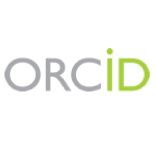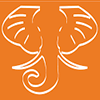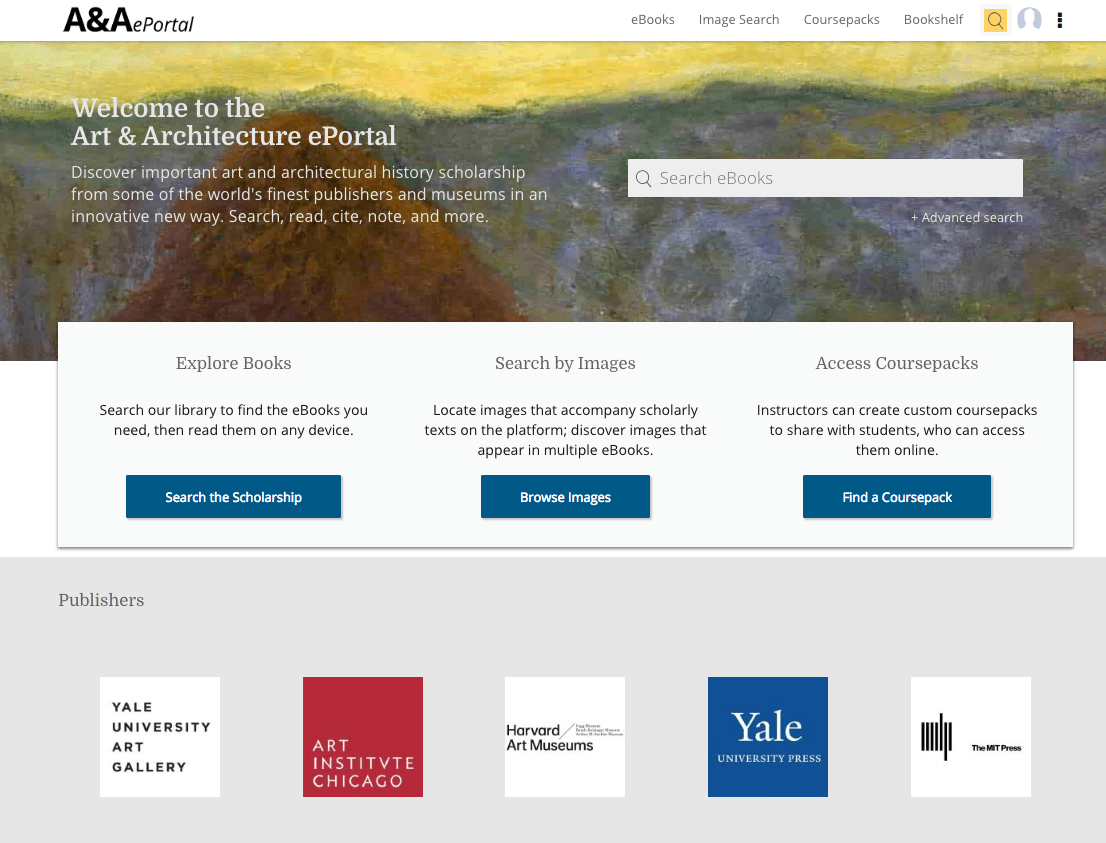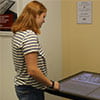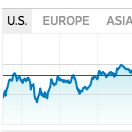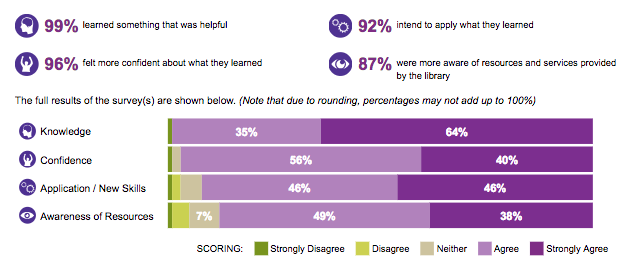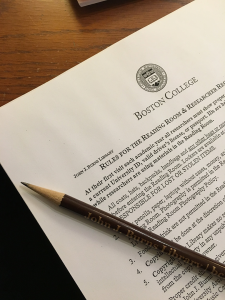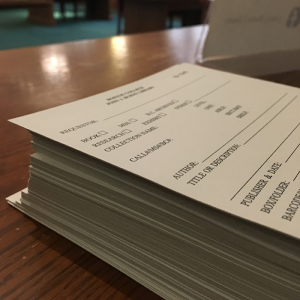Our John J. Burns Library for rare books, special collections, and archives will once again have a booth presence on “Cultural Row” at the annual Boston Antiquarian Book Fair. This year’s Fair will held at the Hynes Convention Center on Friday evening, November 16, through Sunday, November 18.
Complimentary tickets for the opening night reception are available at Burns Library. Entrance to the Fair is free on Saturday and Sunday afternoons. Special events and speakers will soon be announced. Last year, sleight-of-hand artist Ricky Jay gave an illustrated talk about his extraordinary collection of books on magic.
The Book Fair is great opportunity for students and staff alike to browse a dizzying array of collectible books and manuscripts, maps and prints, and paper-based ephemera, as well as to meet and talk with experienced booksellers and collectors in a social environment charged with excitement: everything really is for sale, which makes one appreciate just how much valuable research material exists beyond the resources managed by libraries and archives.
“Attending the fair is an excellent way to spend a November afternoon or evening,” according to reference and archives specialist Shelley Barber, who coordinated the Burns Library presence for more than a decade. “I strongly encourage everyone to come and bring a friend.”
For more years than even Shelley can count, Burns Library has exhibited at the Fair in order to cultivate relationships and add to our holdings. Our booth has been situated next to the Massachusetts Historical Society and Boston Athenaeum, near tables for the Ephemera Society, Rare Book School, and other collecting and educational organizations on “Cultural Row,” a unique feature of the Boston Book Fair, which attracts more than 120 booksellers from around the world. Thus far, Burns Library has been the only special collections library affiliated with a university to exhibit at the Fair—a missed opportunity for others and a strategic advantage for us.
Members of our library staff take turns manning our booth with help from some of our student assistants. A large computer monitor showcases highlights from our collections and digital scholarship projects based on Burns Library materials. Exhibit catalogs and brochures entice passersby to stop and chat. So do buttons, BC-logoed pencils and erasers, and especially a basketful of chocolates!

A steady stream of people do pause to talk, including a number with connections to Boston College. Three years ago, an alum who works with a Connecticut-based art appraisal firm gave us a tantalizing tip: a typescript of Senator John F. Kennedy’s 1956 Boston College Commencement speech annotated in his own hand was going up for sale the following day at Skinner’s auctions in Boston. Further investigation revealed that it was likely his reading copy, as it included a number changes with respect to the draft versions held at the JFK Library and our own University Archives. Needless to say, we made sure to place a bid with a high enough limit to win the lot, which also included the academic hood Kennedy was presented with his honorary doctorate of laws.

The following year, we purchased from the Boston Book Company in Jamaica Plain a privately printed copy of W. B. Yeats’s 1902 play Where There is Nothing. A notable addition to our comprehensive Yeats collection in Burns Library, the acquisition was featured in the Spring 2017 Center for Irish Program Newsletter. When we learned that Boston Book Company proprietor Charles Vilnis specializes in Japanese prints, we engaged his expertise to help us acquire a scarce volume by a modern woodblock artist Yoshio Kanamori to complement our Japanese prints collection.
The Fair has yielded a number of other prizes, such as a copy of a rarely available monument of 17th-century Jesuit science published by Giovanni Battista Riccioli. Titled Astronomiae reformatae (Reformed Astronomy), it accepts the refutation of the ancient Ptolemaic system in which all celestial bodies were presumed to circle the earth, but presents arguments against the Copernican system, which placed the sun at the center of the universe. Riccioli favored a version of Tycho Brahe’s so-called “geo-heliocentric” system, in which the sun, moon, and stars were believed to circle an immobile Earth, while the planets circled the sun.
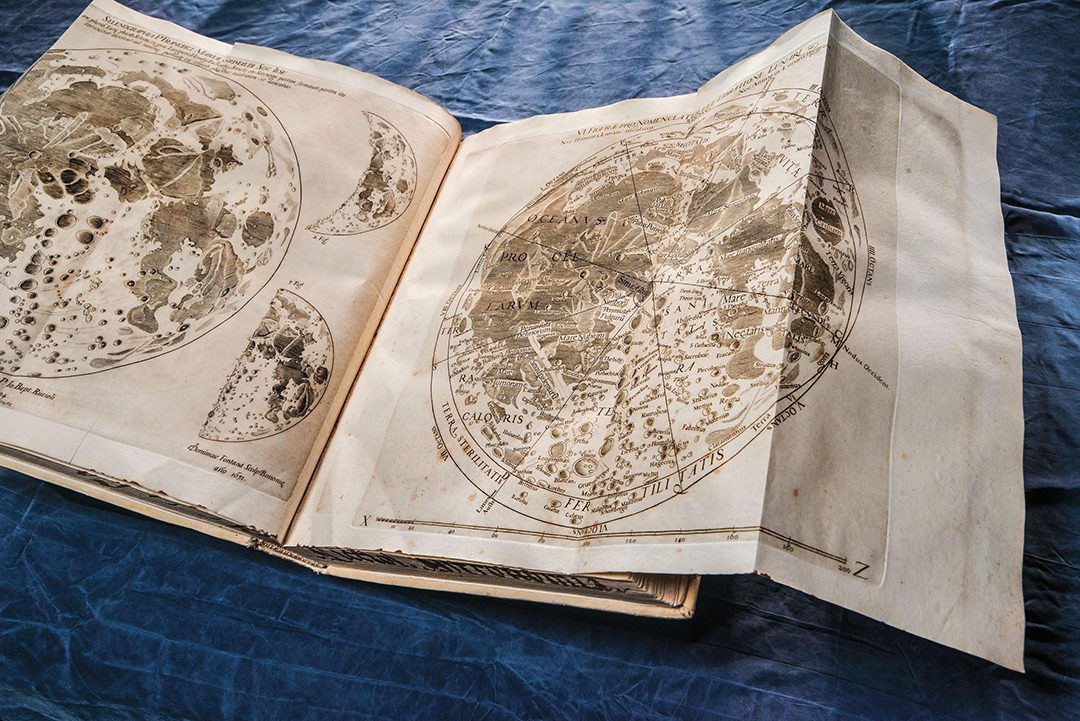
Although Riccioli’s cosmological theories proved incorrect, he made a lasting contribution to astronomy through his naming of the seas and craters of the moon. Ironically, yet presciently, he named the most prominent crater Copernicus. Having purchased the Astronomiae reformatae, we are now scouting the bibliographical universe for a copy of Riccioli’s earlier encyclopedic work on astronomy, the Almagestum novum. Perhaps this year’s Fair will land us one.


